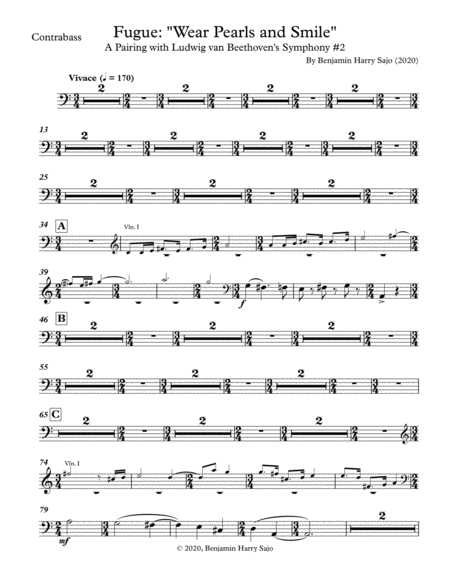Double Bass,String Bass Solo - Level 5 - Digital Download SKU: A0.1018941 Composed by Benjamin Harry Sajo. 20th Century,Contemporary. Individual part. 4 pages. Benjamin Sajo #6072983. Published by Benjamin Sajo (A0.1018941). Fugue: Wear Pearls and Smile is, on the outset, a fast, rambunctious adventure for many voices playing at the same time. It was conceived as a pairing for the equally vivacious second symphony of Ludwig van Beethovenâhis 250th birthday is this yearâbut can stand on its own as one of my hardest, most challenging works to cook up.This piece is dedicated to those forced to appear positive when internally theyâre falling apart. The title is inspired by a quote thatâs been with me for a while, Why is it that men can be bastards and women must wear pearls and smile? by Lynn Hecht Schafren, the celebrated American jurist famous for campaigning for gender equity in courts. Iâm taking the quote out of its initial context, but the power of that quote, for me, exemplifies how hard it is to maintain a sense of emotional decorum and dignity when youâre authentically a hot mess. And whatâs more of a musical hot mess than a fugue?There are two realities to this piece. Iâll quote Dmitri Shostakovich, from his autobiography: The rejoicing is forced, created under threat, [â¦] Itâs as if someone were beating you with a stick and saying, âYour business is rejoicing, your business is rejoicing,â and you rise, shaky, and go marching off, muttering âOur business is rejoicing, our business is rejoicing.â On the one hand, it is insincere happiness, cloying perhaps. But the other truth, Iâll quote Oscar Hammerstein II, from The King and I: While shivering in my shoes / I strike a careless pose / And whistle a happy tune / And no one ever knows, / I'm afraid. I forced myself, against all impulses of my current being, to forge happiness. This piece, with its origin being a mental puzzle (fugues are puzzles), it became a construct where I could lift myself up and regain a sense of purpose. Therefore, it is inventedâout of a literal need to surviveâpure, genuine happiness.Future Performances: If you are interested in performing this work, please e-mail me.ABOUT THE COMPOSER: Benjamin Sajo (b. 1988) is a Canadian composer of contemporary classical music, as well as an educator. Since developing a fiercely independent creative voice upon the completion of his studies at Western (2010) and McGill Universities (2013), he continues to find inspiration from the intersection of mythology, art, and nature upon the contemporary human experience. In 2019, he released his premiere album of original music, The Great War Sextet: Canadian War Poetry with Trombone & Strings , with support from the Ontario Arts Council. He is a member of SOCAN and the League of Canadian Composers.
